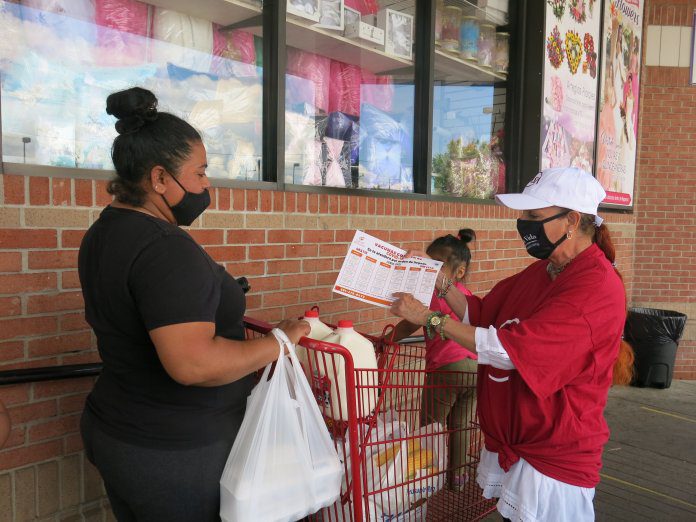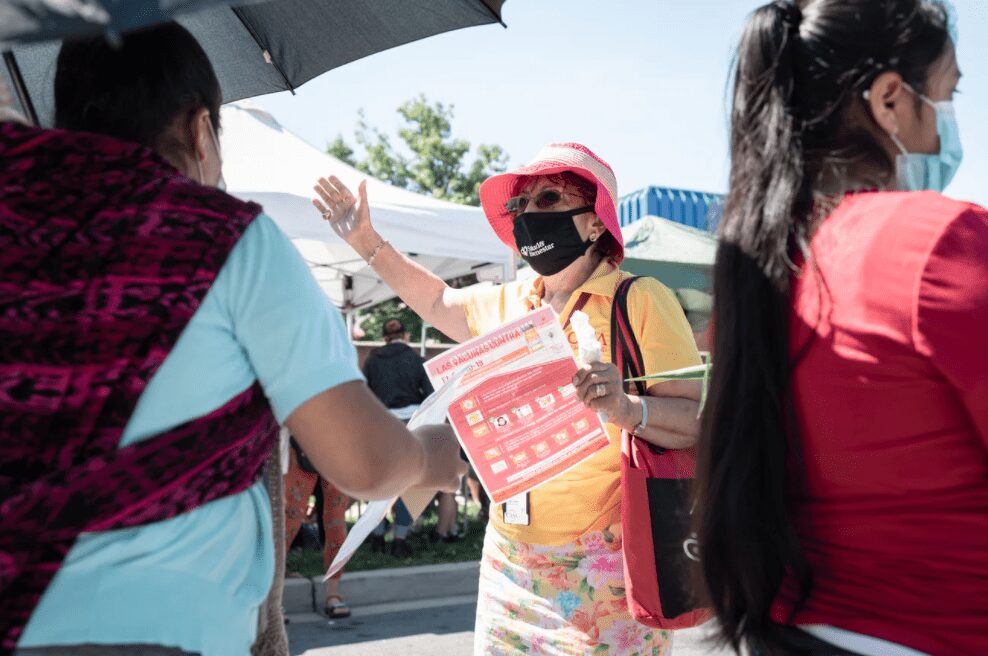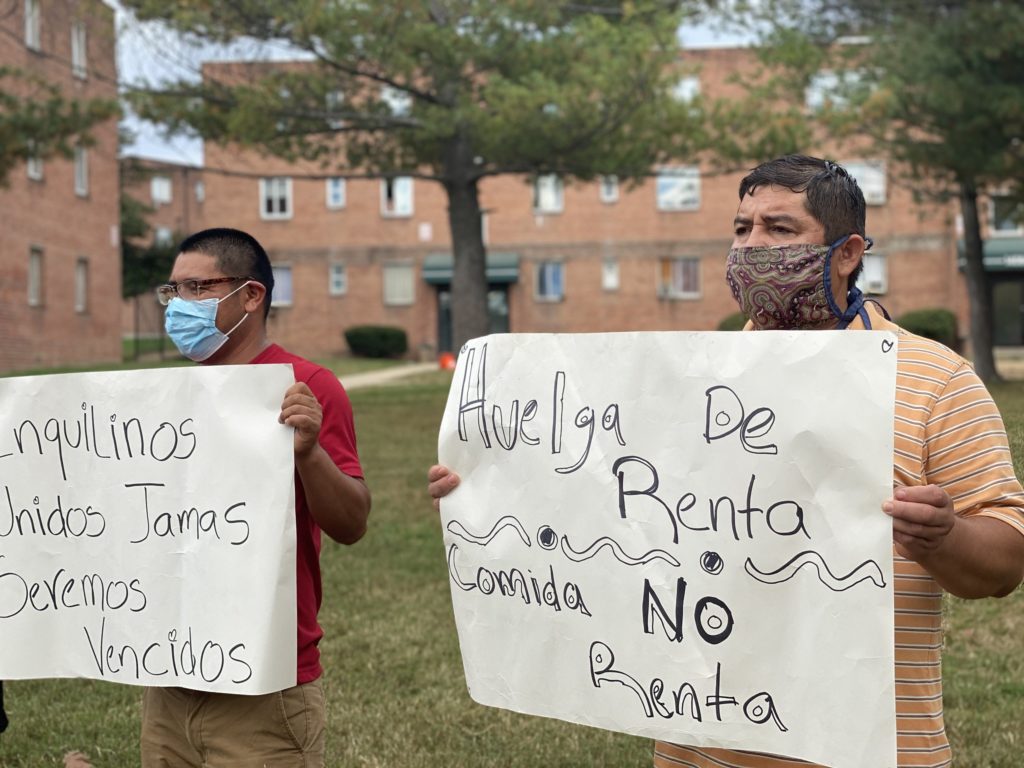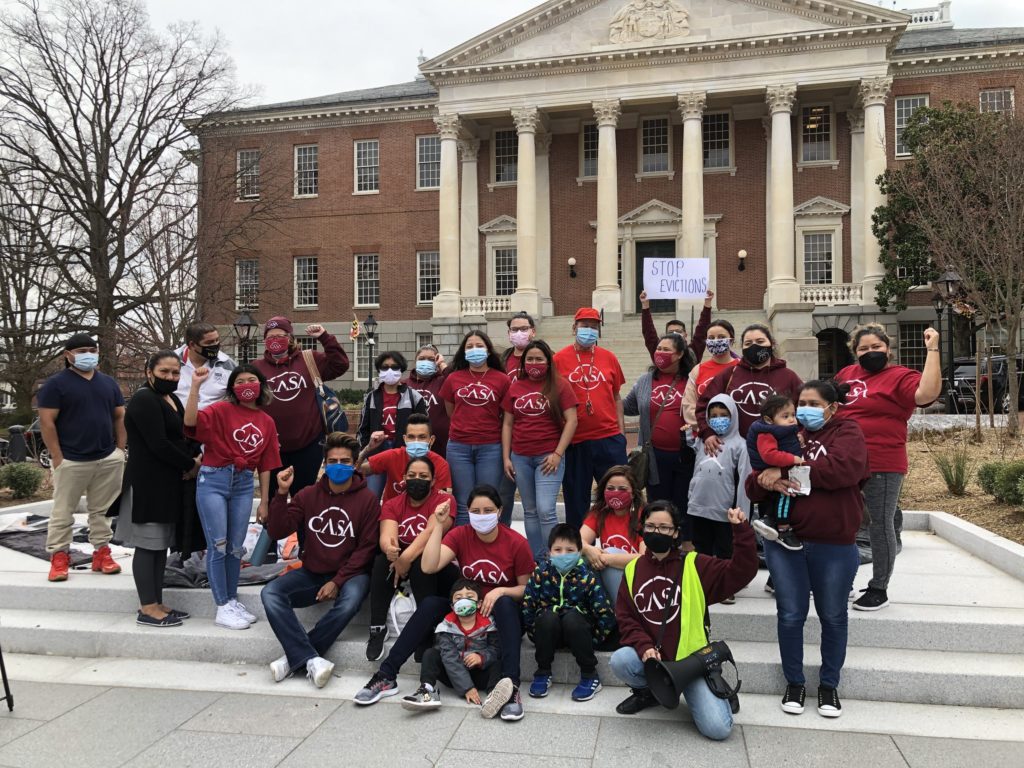Chapter 1
2021, The Year
CASA Could Not
Be Stopped
The COVID-19 pandemic has not merely amounted to a time of struggle, but also of victories. Whether it’s CASA’s efforts to limit the scope and severity of the virus in our community, or the continuation of the essential services and advocacy we provide in the face of the pandemic, 2021 has been the year CASA and our community proved we can face any challenge together.
Recovering from COVID-19
Stopping the Spread
Since the immigrant and working class community bore the brunt of the impact of this pandemic, our work against covid in 2020 was primarily focused on helping our community to survive as their lives and livelihoods were completely upended. This work mainly took the form of direct aid, advocacy, and community development. In 2021, through contracts with state and local governments, including major programs in Prince George’s and Montgomery Counties in Maryland and Fairfax and Prince William Counties in Virginia, CASA launched a massive contact tracing program. This program served the dual goal of both reducing the spread of COVID-19 in immigrant communities while also providing consistent, well-paying jobs for community members who had been left with few options or opportunities.
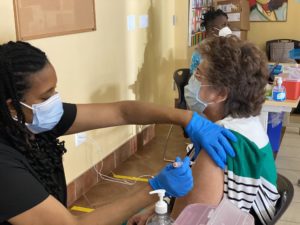
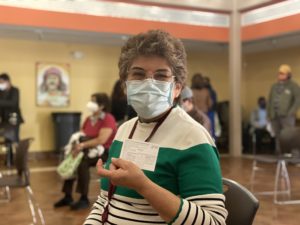


Vaccinating Our Community
CASA was out in front of the effort to get vaccines to our community from the very beginning. Dating all the way back to the early stages of vaccine development, CASA and the University of Maryland School of Medicine administered COVID-19 vaccine trials to those historically underrepresented in public health research, including Latinx and Black communities. The vaccine trials focused on recruiting diverse participants based on the culturally competent design of the study. Parts of the Multicultural Center, CASA’s Hyattsville, MD office and headquarters, were transformed into a medical clinic to run the vaccine trials. In Langley Park, a hotspot for COVID-19, a team of 15+ health promoters was put on the ground, educating and recruiting at laundromats, bus stops, supermarkets, farmers markets, and other real spaces of the Black and brown community. Similarly, a team of Community Health Workers in Baltimore lead CASA’s efforts there in engaging and incentivizing Black and Brown community participation in the trials.
“The COVID-19 vaccine trials must include communities of color who have been the most affected by the virus,” said George Escobar, CASA’s Chief of Programs and Services. “After serving selflessly on the frontlines, our communities deserve the best medicine science can offer. Excluding our communities could mean experiencing side effects when the vaccines are publicly available. This is one of the best tools that we have to fight the pandemic. I am participating in the trial myself and got vaccinated in late August.”
“We are looking to conduct the highest quality research that includes a diverse group of people,” said Karen Kotloff, MD, Professor of Pediatrics and the University of Maryland School of Medicine’s principal investigator in its COVID-19 vaccine trials. “This virus is not democratic. We know that it has impacted minority populations the most and we want to ensure that any research we conduct will help these communities. If the coronavirus is affecting these communities at a disproportionately higher rate, they undeniably need a vaccine that will work for them. Collaborating with CASA allows us to reach out to these communities and let them be participants in the process for a COVID-19 vaccine.”
CASA’s vaccination program began at the end of March 2021 with a “Shuttle to the Vax” Program in partnership with University of Maryland Medical System (UMMS) and University of Maryland-Baltimore (UMB).
UMMS is a medical provider at Baltimore City’s Convention Center, which serves as a mass vaccination site for the state. In the course of our participation we noted many gaps in access for Latinx and immigrant community members, particularly in cultural sensitivity and real-time interpretation and troubleshooting. We brought these concerns to the attention of UMMS, and our advocacy resulted in the designation of a four-hour window set aside for CASA staff to directly schedule appointments for our community members, and to accompany community members to the site for logistical support. The site also modified its deployment of services for immigrant and Latinx patients by establishing a special entrance and registration verification process so that patients in need of language support would not have to wait an additional 1-3 hours compared to English speakers. In addition to this advocacy, we shuttled patients who made appointments through us to the site, closing the transportation gap that otherwise kept many from accessing the vaccine. Our partnership with UMMS expanded in June as they became a permanent vaccine provider at our Baltimore Center. This was a particularly significant development, as the Pfizer vaccine UMMS carries can be administered to youth as young as 12.
We established additional partnerships with MedStar and Care for Your Health in order to bring mobile clinics to the underserved community of south Baltimore, leveraging our existing association with Lakeland Elementary-Middle School to serve as a host site, as well as to various apartment complexes, local businesses, and churches with the goal of reaching our most isolated community members.
To date, CASA has vaccinated over 3,000 community members in the Baltimore region and continues to hold vaccination clinics at its Baltimore Center three times a month. Notably, during June and July, more community members were vaccinated at CASA than at the city’s mass vaccination site. We believe this success is a testament to the trust we have built in Baltimore and the success of our model of bringing vaccination services directly to the community.
Our vaccination work was exemplary across CASA’s entire footprint. CASA has vaccinated thousands and continues to combat the vaccine gap among Latinx and immigrant communities through consistent outreach, messaging, and organizing. As a trusted source of information in the community, CASA has a unique role to play in helping our Black, brown, and immigrant membership to stay safe and return to normal life as soon as possible. Beginning in February, CASA’s Langley Park, Wheaton, and Silver Spring locations conducted ongoing weekly vaccination clinics in partnership with the National Guard, among others. Within 6 months, CASA distributed 5,174 vaccines to the community. This work will continue into 2022 with the administration of boosters.
A Trusted Voice
CASA’s Health Hotline
In 2011, CASA launched the Multilingual Health and Human Services Hotline to provide health education and referrals, as well as navigational assistance to health services, food banks, shelter and other vital social services. In this its tenth year of continuous operation, CASA’s hotline reached over 12,750 individuals, connecting community members with critical resources as they continue to navigate COVID-recovery. In total, CASA’s hotline provided 24,169 referrals this fiscal year. CASA’s hotline team has also grown from three to seven staff members dedicated to providing comprehensive information in Spanish and French, with capacity in additional languages through our partnership with Montgomery County.
Training Community Health Workers
As the pandemic continues, CASA’s team of promotoras and Community Health Workers have led a sustained vaccination and public health education campaign. This program has received national attention for its work addressing the needs of community members, while simultaneously educating them about available resources. As we have reached more and more communities, CASA has intentionally expanded the program and fostered partnerships that will train a new generation of Community Health Workers.
This year we leveraged our partnerships with Baltimore City Community College (BCCC) and the Community College of Baltimore County (CCBC) to equip our center as a Wi Fi-tech hub so that workers can take vocational training courses even if they do not have the necessary remote capabilities at home. We also worked creatively with our community college partners to transition unemployed members to the booming field of health services, as well as supporting day-laborer members in obtaining warehouse certifications and facilitating online course work for community members to train as Certified Nursing Assistants (CNA), Community Health Workers (CHW) and child care providers. We have held three cohorts, with a total of 30 participants on track to graduate and receive their certification. This model aims to ensure that Baltimore has a pipeline of bilingual CNAs and CHWs to meet the community’s needs during the pandemic and beyond.
Profiles of Our Community Health Worker Heroes
Stephani is a 22-year-old DACA recipient from Guatemala who graduated with honors from the Academy for College and Career Exploration in Baltimore four years ago. Stephani was accepted to Notre Dame to study nursing but was forced to drop out after the first semester due to financial hardship—Stephani was the only person in her family of five with a work permit. While juggling work at a local diner and at a medical clinic, she learned about CASA’s new vocational training program. Without hesitating, she signed up for the course, and is now on track to finish her clinical hours and obtain her certification.
Kenia is a 50-year-old, Afro-Latina immigrant from Cuba. Prior to immigrating to the US, Kenia was a civil engineer. However, once she arrived in-country she decided on a career change and eagerly joined the first CNA cohort amid the ongoing pandemic. Kenia experienced a reduction in her hours and eventually lost her dayjob, which tested her ability to continue in the course. Thanks to the wraparound services support available at CASA, she was able to obtain much-needed emergency food, rent and utility assistance, which allowed her to keep her goal on track. Kenia successfully completed the full CNA course and is currently on track with her peers to finalize her clinical hours. Kenia will join CASA’s winter job fair, through which we hope to connect all graduates with jobs available through our medical partners and the city’s health department.
Housing is a Human Right
Housing Justice
CASA’s housing justice work has grown from informal tenant organizing and advocacy to a 15-year-long campaign to ensure that thousands of tenants in the DC metro and mid-Atlantic region know their rights, can enjoy improved housing conditions, maintain access to police, county officials, landlords, and other decision-makers in public and private meetings, and are able to come together in association to advance their interests. CASA’s model seeks to empower tenants through both education and dual support from CASA’s legal and organizing teams.
Since the start of our housing stability work, CASA’s legal staff have provided counsel to 770 community members. CASA’s supervising attorney, Jonathan Riedel, initiated 70 eviction protection cases in the past year and successfully defended and closed 62. Mr. Riedel also provided counseling and direct representation to an additional 300 members on issues such as illegal lockouts, excessive fees and charges, improper debt-collection tactics, poor housing conditions, and lease disputes.
Many of the community members CASA works with were left out of government assistance programs, including COVID relief, meaning that their best chance of getting aid and eviction protections has been from the owners of their rental units. While organizing these efforts, CASA staff are simultaneously helping families apply for housing assistance from the county and state and connecting people with legal support in connection with health insurance, food, and internet access. Beyond these immediate service needs, CASA organizers are also working towards legislation to freeze late fees, increase aid in rental help, mandate public defenders in eviction cases in court, increase the cost to file for an eviction in Maryland (from the current $15 to $125) and mandate that landlords maintain certain air quality standards. As the pandemic has at times limited organizers’ ability to take buses to actions and events, CASA has focused on setting up tenant meetings locally, right outside apartment complexes. These meetings took place outdoors regularly, empowering more than 2,000 residents to fulfill their own needs in their own communities.
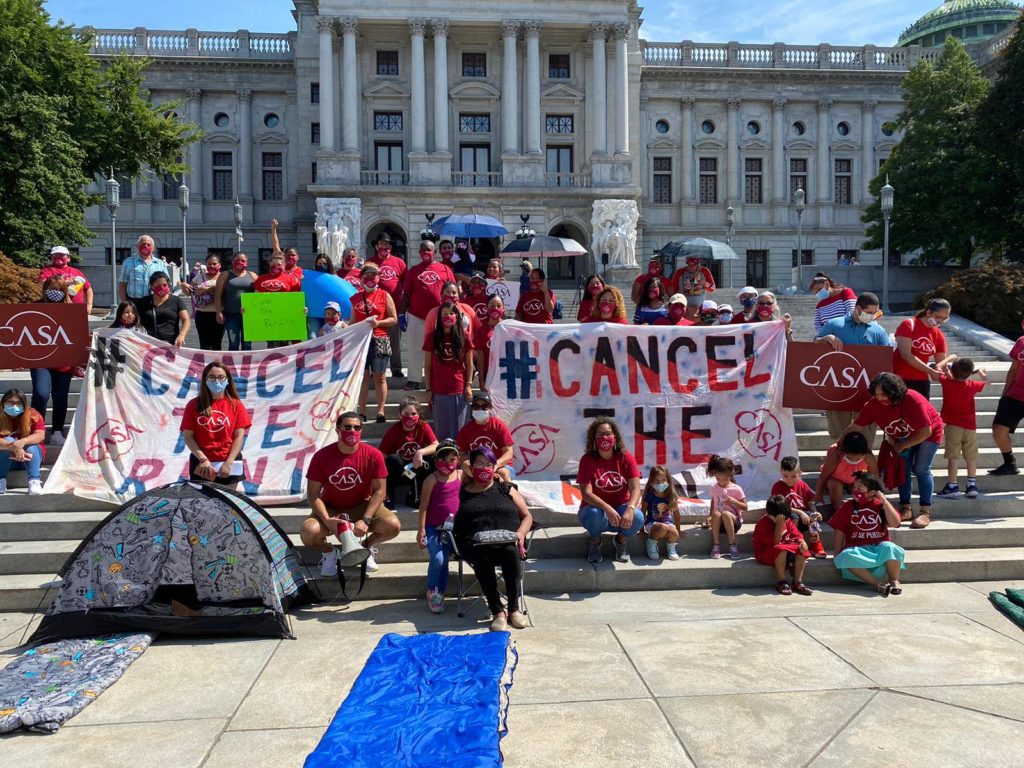
Tenant Organizing Victories in a Time of Crisis
Our tenant organizing work this year resulted in concrete gains for tenants, including rent strikes at three different properties. At Villas of Langley, we won an eviction freeze for a year, a rent freeze for a year, $190,000 in rental assistance from ownership, and an additional $300,000 in rental assistance from the County. At Park Tanglewood in Riverdale, we prevented numerous evictions, secured a commitment from management to perform maintenance within 24 hours of a tenant’s request, and won a combined $150,000 in assistance from the landlord and County. At Bedford/Victoria Station, our biggest housing campaign, we have prevented evictions and won $800,000 from the landlord and County. We also achieved passage of legislation that includes a right to counsel for tenants facing eviction, and this year we are looking to achieve funding to provide those counselors to all tenants.
“Elected officials should stop at nothing to protect renters recovering economically from the pandemic and stave off homelessness, and this bill seeks to accomplish that,” said Alex Vazquez, CASA lead organizer for Montgomery County, who helped organize tenants for this cause.
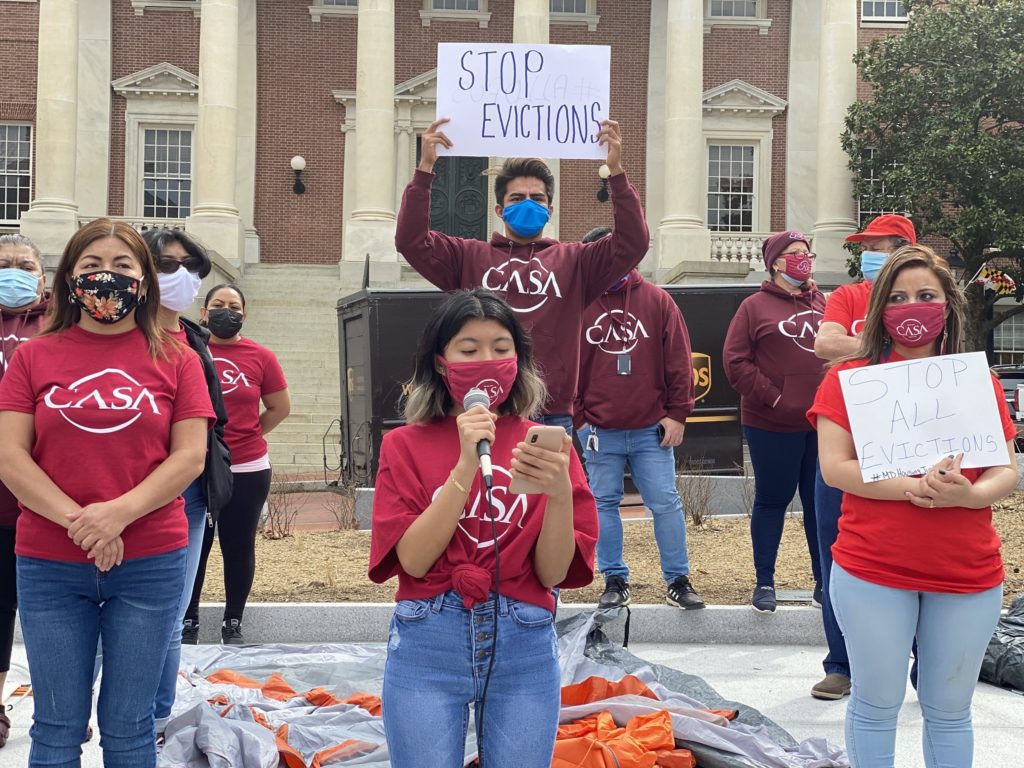
Baltimore City:
CASA successfully advocated for legislation requiring landlords to offer tenants a reasonable opportunity to renew their lease. The bill is aimed at closing a loophole that has been used to evict renters who would otherwise be covered by federal or state COVID-related eviction moratoria, as these do not restrict a landlord from evicting a tenant who is “holding over” the property at the expiration of a lease. The bill establishes a requirement during the state of emergency (and 90 days after its expiration) that landlords must offer tenants the opportunity to renew their leases unless a “good cause” exception exists.
Baltimore County:
CASA helped pass the Tenant Protections During an Emergency Act, which took effect October 19 and during the pandemic prevents landlords from: raising rent until after they have provided tenants with 60 days’ notice, reporting a tenant’s failure to pay rent to a credit bureau or rating agency, or charging late, court, or payment processing fees.
Montgomery County:
CASA celebrated the unanimous passage of Montgomery County Council Bill 30-21. CASA members spent months sharing powerful personal stories, talking to council members and their staff, and rallying for housing rights, which contributed greatly to this tenant victory. Sponsored by Council Member Will Jawando, Bill 30-21 limits rent increases for six months and prohibits landlords from charging late rent payments fees accrued for one year after the expiration of the Maryland State of Emergency.
© 2024 All Rights Reserved | Privacy Policy | Website designed and developed by IndieTech Solutions

